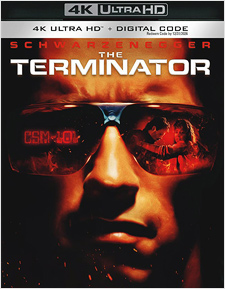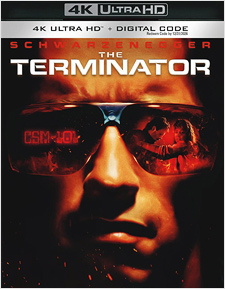Terminator, The (4K UHD Review)

Director
James CameronRelease Date(s)
1984 (November 19, 2024)Studio(s)
Hemdale/Pacific Western Productions/Orion Pictures (MGM/Warner Bros. Discovery Home Entertainment)- Film/Program Grade: A
- Video Grade: A
- Audio Grade: A
- Extras Grade: C+
Review
In 1984 Los Angeles, a young woman named Sarah Connor (Linda Hamilton) goes about her day, unaware that a relentless cyborg assassin known as a Terminator (Arnold Schwarzenegger) has been sent back in time from the year 2029 to kill her. Also arriving from the future is Kyle Reese (Michael Biehn), a soldier whose one-way mission is to stop this Terminator and save Connor at all costs, because she’ll one day be critical to the survival of humanity. But as it turns out, stopping a Terminator is no easy task.
[Editor’s Note: The next paragraph has been updated for detail and accuracy about the film’s production—my thanks to producer Gale Anne Hurd for her input!]
After honing his skills in special effects and production design for Roger Corman’s New World Pictures on films like Battle Beyond the Stars (1980) and Galaxy of Terror (1981), as well as John Carpenter’s Escape from New York (1981), James Cameron was eager to tell a science fiction story of his own on film. Producer Gale Anne Hurd met Cameron when he was building models for Battle Beyond the Stars (she was the film’s assistant production manager). After working closely together, the pair decided to collaborate on future projects. And while Cameron was on location directing Piranha II: The Spawning in 1982, he had a dream featuring a man-like killing machine that was the genesis of The Terminator. This he shared with Hurd and friend and writer Bill Wisher, which resulted in a 40-page treatment and eventually a screenplay. Every major studio in town turned down the project, however Orion Pictures took interest. Cameron originally wanted Lance Henriksen to play the cipher-like title character, and at one point even O.J. Simpson was considered (by Orion) for the role. Schwarzenegger was actually sent the script with the intention that he consider playing Reese, but he apparently found the Terminator character more relatable. Cameron apparently agreed, the production was given a ‘go,’ and the rest is history—while Conan the Barbarian (1982) was certainly Schwarzenegger’s Hollywood breakthrough, The Terminator would ultimately define his acting career.
Despite its low budget, Cameron’s experience in special effects served the film well, allowing him to conceive effective visuals, make-up and mechanical effects, and miniatures with the help of Stan Winston and Gene Warren Jr. The Terminator effectively combines its live-action footage with stop-motion animation, rear projection, and other techniques. Its direction is inventive and efficient, with the camerawork and Mark Goldblatt’s editing working in concert to build relentless tension. And the edgy synthesizer score by composer Brad Fiedel feels both futuristic and perfectly of its time, featuring a theme that’s since become iconic. The simple truth is that, against all odds, Cameron’s The Terminator has aged remarkably well—it’s just taken forty years for reality to catch up to it.
The Terminator was shot by cinematographer Adam Greenberg (The Big Red One, Alien Nation, T2) on 35 mm film (specifically Eastman 250T 5293 stock) using Arriflex 35 BL, Arriflex 35 III, and Fries Mitchell 35R3 cameras with Zeiss Super Speed spherical lenses. It was finished in a traditional analog/photochemical process with visual effects and titles composited optically, then released into theaters with a matted 1.85:1 aspect ratio.
For its release on Ultra HD, it appears Lightstorm and Park Road Post have gone back to the film’s 2013 4K scan (from which the Lowry Digital 2013 Fox/MGM Blu-ray was created) and digitally-remastered the image under the supervision of Cameron and Geoff Burdick. This appears to be a significant refinement of Park Road’s AI “re-visualization” process (to borrow a term coined by former Bits contributor and long-time film restoration expert Robert A. Harris), which was employed on Cameron’s previous films in 4K.
Image detail has definitely been enhanced, but with a somewhat lighter touch. Nothing like the heavy-handed and waxy scrubbing that was so obvious on T2 or True Lies is apparent here. Skin, facial features, costume textures, wood—all of it appears more natural, at least on first glance. And surprise—there’s grain! Based on reports from early theatrical screenings, I didn’t expect to see any, which suggests the grain has been added back in digitally. Nevertheless, it’s organic looking—never static—and it generally appears at levels appropriate to photochemical films of this vintage (and this film in particular).
What’s more, the occasional speck of dust on the negative has been left in, particularly in optically-printed titles and effects shots. Take a look at Chapter 2, around the lettering when the text “Los Angeles 1984 1:52 a.m.” appears. Then in Chapter 4, look at the road on the right side as the police car passes—there are definitely little flecks that were clearly on the negative and they’ve been left in. I went back to the 2013 Blu-ray, and they’re visible there too—except now they’re far more subtle (which suggests Lightstorm did indeed go back to the 2012 4K scan, rather than simply upsampling the Blu-ray master).
The AI remastering could easily have cleaned all of that away, but those little analog/photochemical traces have been preserved throughout the film. And the HDR grade (compatible with both HDR10 and Dolby Vision) features more vivid colors, with greater subtlety and nuance than ever. Highlights are very bold, with deeper blacks—and mostly this is pleasing, though in a few nighttime scenes the image seems a tad too bright (or has a bit more zing than you’re used to). And all of this has been encoded to fit on a 100 GB disc (with data rates in the 65-75 Mbps range).
Ultimately, I have to say: I’m a little shocked. But I’m also impressed. I understand that there’s plenty of well-earned skepticism about this 4K remaster. Everyone should evaluate it for themselves, and some fans may still not find it to their liking. It also remains to be seen what a detailed scene-by-scene image comparison (between the UHD and the 2013 Blu-ray) might reveal. But to my eyes, this is the best of Lightstorm and Park Road’s James Cameron 4K catalog restorations to date, slightly edging out Titanic and The Abyss (though I can’t quite grade it higher). This much I can say: I would dearly love to see them revisit True Lies, Aliens, and especially StudioCanal’s appalling T2 UHD release with these improved “re-visualization” settings. (And I’ll take all of those on 4K discs please.)
Audio-wise, the 4K disc offers a new English Dolby Atmos mix that sounds terrific and is full of muscular bluster. The stage is bigger and more immersive than ever before, with lots of active directional cues and panning. But it also sounds far more modern than the film’s original theatrical mono audio experience, and there’s definitely been a few sound effects upgrades (not unlike the 5.1 mix on the Fox Blu-ray release from 2013) that may prove controversial. Thankfully, the 4K disc also includes that original theatrical audio in DTS-HD MA 2.0 mono—and as far as I can tell it is indeed the original mix. (I’ll leave it to the super-fans to exhaustively compare the mixes to be sure, and I’ll update this review should any anomalies come to light.) English Descriptive Audio is also available, as are 5.1 DTS-HD MA mixes in French, German, Italian, Castilian Spanish, and Latin Spanish, along with Czech 2.0 Dolby Digital. Optional subtitles are included in English (for the Deaf and Hard of Hearing), French, German, Italian, Castilian Spanish, Latin Spanish, Dutch, Chinese, Czech, Danish, Finnish, Norwegian, and Swedish.
The new 4K release from MGM (distributed by Warner Bros. Discovery Home Entertainment) features the film in Ultra HD only—no Blu-ray is included in the Amaray package. (The 4K is also available in Steelbook packaging). The UHD disc includes the following special features:
- Deleted Scenes with Optional James Cameron Commentary (Upsampled SD – 12 shots/scenes – 9:59 in all)
- Creating the Terminator: Visual Effects & Music (Upsampled SD – 12:58)
- The Terminator: Closer to the Real Thing (Upsampled SD – 11:56)
- Unstoppable Force: The Legacy of the Terminator (Upsampled SD – 9:38)
The deleted scenes were on the original MGM DVD Special Edition from 2001. Creating the Terminator was included on the 2013 Fox Blu-ray, while both The Terminator: Closer to the Real Thing and Unstoppable Force: The Legacy of the Terminator are from the 2005 UK Definitive Edition DVD release.
Sadly missing from the Fox/MGM Blu-ray is the Terminator: A Retrospective featurette (SD – 20:30), which was actually produced by Carolco Home Video and distributed by Live Home Video on VHS back in the day. And missing from 2001 MGM DVD are the Other Voices: Back Through Time – Creating The Terminator documentary (SD – 60:19), The Making of The Terminator: A Retrospective (SD – 18:10 – this is different than the Carolco piece), multiple storyboards and stills galleries (including James Cameron Artwork, Production Photos, Stan Winston Effects, Fantasy II: Visual Effects, and Publicity Materials), James Cameron’s original story treatment, the film’s teaser trailer, theatrical trailer, international trailer, 2 TV spots, and Easter eggs. So be sure to keep those discs if you want everything. (There may also be additional extras for this film on other legacy home video SKUs; what I’ve listed above is everything I currently have access to here at The Bits.)
Note that you do get a Digital Copy code on a paper insert, but sadly one that redeems with Vudu/Fandango at Home only and not Movies Anywhere.
It’s a strange thing to watch James Cameron’s The Terminator again in 2024, with humanoid robots becoming real things in the physical world, and AI a topic that’s very much on the minds of… well, anyone who’s actually involved in (or closely following) current tech industry developments. Lightstorm and Park Road Post’s new 4K remaster is their most impressive to date, offering all the benefits of HDR and more fine image detail than ever—without the waxy look of the dreaded T2 or True Lies 4K releases—while mostly preserving (or restoring) appropriate levels of grain. The image definitely looks crisper and bolder—a little more modern, if you will—and some may still find it off-putting. But it also still looks cinematic. Compared to the previous Cameron 4K remasters, that’s a significant win.
- Bill Hunt
(You can follow Bill on social media at these links: Twitter and Facebook)

